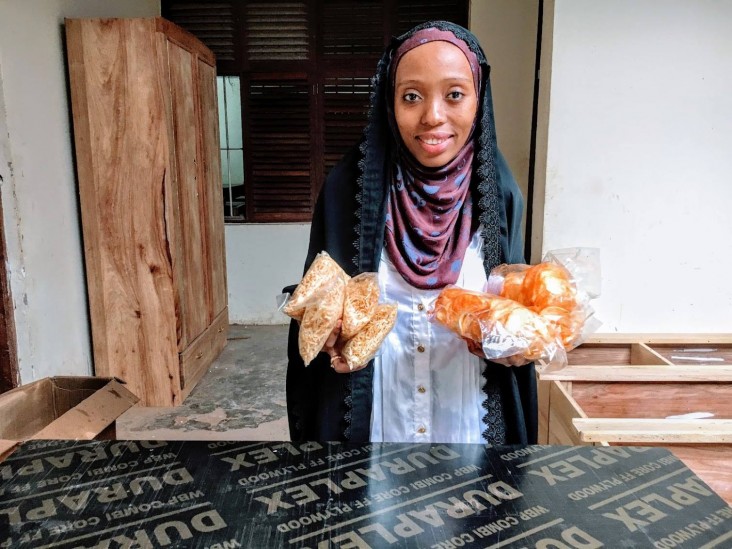Speeches Shim

October 2018 — After graduating at the top of her class in Tanzania with a degree in community development, Ummi Shaib expected to find a position in social work. But three years into her job search, she faced rejection after rejection. With employment opportunities seemingly hopeless, and under mounting pressure from her family, Shaib decided to marry so she could “at least have a husband to depend on.”
A year after exercising what she believed to be her “only option,” Shaib gave birth to a child. It was then she realized her husband’s income would not be sufficient to support the whole family.
To put her social work education to use, Shaib began volunteering as a community mobilizer at a youth center. While there, she had the chance to attend a five-day training in May provided by USAID’s Feed the Future Advancing Youth project, which focused on entrepreneurship and youth savings.
In Iringa, Mbeya and Zanzibar, a total of 61 youth learned how to establish and manage savings groups while training other youth in the community to do the same. The group also cultivated life skills for healthy living, exploring topics such as reproductive health and family planning. Finally, the participants benefited from discussions about leadership topics including negotiation, strategic planning, and problem solving.
The training provided the perfect jumpstart for Shaib. It gave her the guidance and confidence to put an idea into action. She says the skills she learned have changed the way she views herself and the world.
“Before the Feed the Future Advancing Youth entrepreneurship training, I had hundreds of business ideas but did not know which one to pursue and did not feel I had the capacity to run a successful business,” says Shaib. “The training enabled me to realize what resources I already had and how to connect those resources with market demand to build a business and make a living.”
The basic business planning and entrepreneurship lessons helped Shaib to identify an opportunity within her reach, so she decided to start making cassava crisps. The next day, she brought 10 packets of her newly rolled out product with her to the youth center where she volunteered. She sold out within an hour, proving there was a demand for her product. Encouraged to continue, Shaib now employs her sister to cook and pack cassava crisps, while she sells them at her office and to street vendors at the main market in Zanzibar.
For the 800,000 young people in Tanzania who enter the workforce each year, there are only about 100,000 available jobs. Lack of employment opportunities will continue to be a challenge until the economy grows and demands a larger workforce. In the meantime, entrepreneurship remains a viable alternative means of support.
The fruits of the entrepreneurship and youth savings seminar did not stop with Shaib’s success. Participants established 73 youth savings groups across the three target regions in just two months; in that time, over 1,000 youth raised nearly $10,000. The groups hold regular meetings, save together, and use those savings to issue loans to members. The loans are offered at an agreed upon interest rate, which provides a return on members’ savings that is shared among the group.
Trained group leaders like Shaib also connect members to basic business development services, such as training, marketing and consultancy, through the Advancing Youth activity.
For Shaib and many of the youth in the groups, this is their first experience saving and borrowing money: a first step toward financial inclusion. “The mix of skills you receive from this program are useful beyond starting a business, and even help you navigate family and community issues,” says Shaib.
“Seeing the growth of my own small business, I now promote entrepreneurship to other Zanzibari youth,” she adds. “We need more entrepreneurs. I wasted three years looking for a job, while by starting my own business, I provide employment to others and an income for myself and my family.”
In addition to managing her own cassava crisp business, Shaib manages two different savings groups. She has walked the first steps on her path to self-reliance — and more entrepreneurs like her will continue to follow.
In its first year, the Feed the Future Advancing Youth project conducted trainings in Iringa, Mbeya and Zanzibar, impacting over 1,600 youth. The activity, which runs from 2017 to 2019, aims to increase income opportunities for 21,500 young people across Tanzania.
LINKS
Follow @USAIDTanzania, on Facebook, on Flickr

Comment
Make a general inquiry or suggest an improvement.